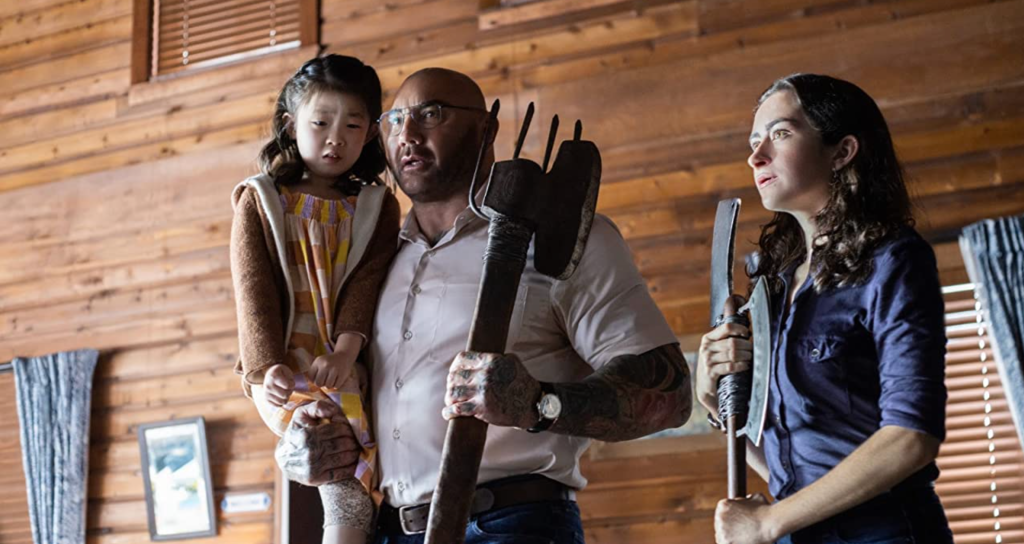Is the sacrifice of an innocent life to save the world justified? The question has played out in many famous works of art, a play on the Christ archetype that discomfitingly forces audiences to consider how far they’d be willing to take utilitarian logic of the trolley problem. Knock at the Cabin explores that question with an interesting twist: A family must pick a sacrificial lamb from among their ranks, and the chosen one must voluntarily die. It is not enough for a death to occur—the deceased must choose it.
Eric (Jonathan Groff) and Andrew (Ben Aldridge) are a gay couple vacationing at a remote cabin with their adopted 7-year-old daughter, Wen (Kristen Cui). While playing in the nearby woods, Wen is approached by Leonard (Dave Bautista), an enormous man who says he wants to be her friend and that he is there to help her family make a difficult decision. Three other strangers walk out of the woods, the family is tied up when they try to resist, and eventually Leonard explains that the foursome is there to prevent the apocalypse. They were all chosen, he says, and experienced shared visions of the end of times and, more importantly, how to avoid it: By coming to this cabin and convincing Eric, Andrew, and Wen to select a member of their family to kill.
The horror of the film springs from the premise. There is little in the way of traditional horror tropes—only one mild jump scare, and what gore there is typically occurs just off screen. Writer and director M. Night Shyamalan goes to lengths to unnerve audiences even further by emphasizing how normal Leonard and his collaborators are. Only one of them is portrayed in a negative light, Redmond (Rupert Grint), who is caustic and earlier went to prison for assault. As for the rest: Leonard is an elementary school teacher and coach. Sabrina (Nikki Amuka-Bird) is a nurse. Adriane (Abby Quinn) is a loving mother, who adores her son and her job as a chef. They even go to great, and humorous, lengths to stress that they’re not homophobes when they realize the couple they’ve just fought and kidnapped is gay.
That figures so kind—breaking and entering, assault, and kidnapping aside—are the ones pushing along a murderous plot makes it all the more disconcerting, particularly as the film goes out of its way to maintain a level of ambiguity as to the validity of their visions. The result is not scary, per se, but a slow burn of anxiety. Unfortunately, that is done away with in one fell swoop when Shyamalan reveals definitively whether the visions are accurate or not near the end of the film.
The film is beautifully shot, with the beautiful landscape providing a jarring contrast to the plot. And the cast all turn in stellar performances, with Bautista bearing particular note. He continues to show that he is the best working former professional wrestler in Hollywood, with a range that his more famous peers Dwayne Johnson and John Cena never display. He can do comedy, he can do action, he can do drama—Bautista’s gentle-giant performance as Leonard makes Knock at the Cabin as good as it is.
Knock at the Cabin provides three-quarters of a great movie, with the last portion falling victim to Shyamalan’s misplaced but understandable desire to provide the audience with answers. Horror works best when it plays with the unknown and the unknowable. Knock at the Cabin may chill you for most of its runtime, but its final act falling apart prevents it from becoming a true horror classic.







Please note that we at The Dispatch hold ourselves, our work, and our commenters to a higher standard than other places on the internet. We welcome comments that foster genuine debate or discussion—including comments critical of us or our work—but responses that include ad hominem attacks on fellow Dispatch members or are intended to stoke fear and anger may be moderated.
With your membership, you only have the ability to comment on The Morning Dispatch articles. Consider upgrading to join the conversation everywhere.